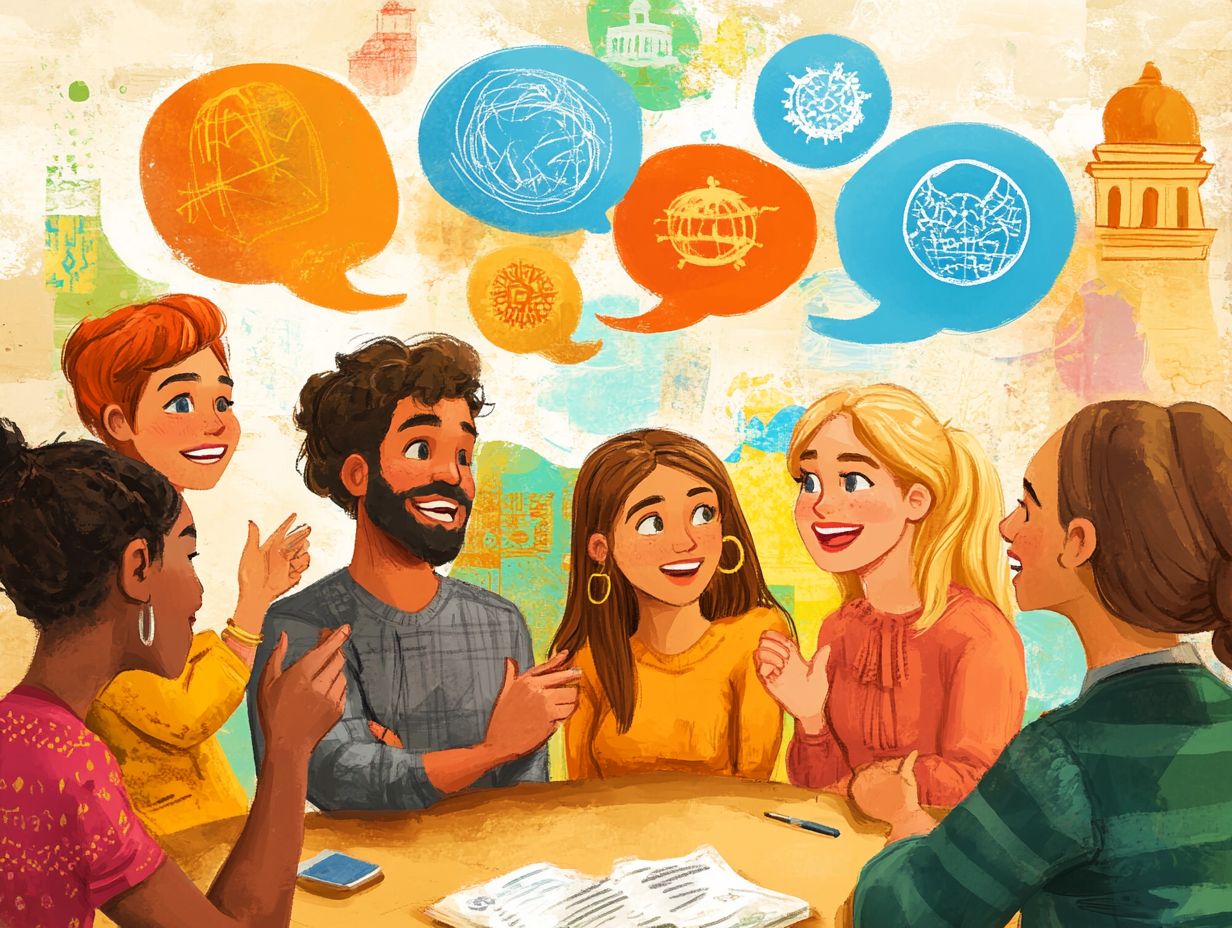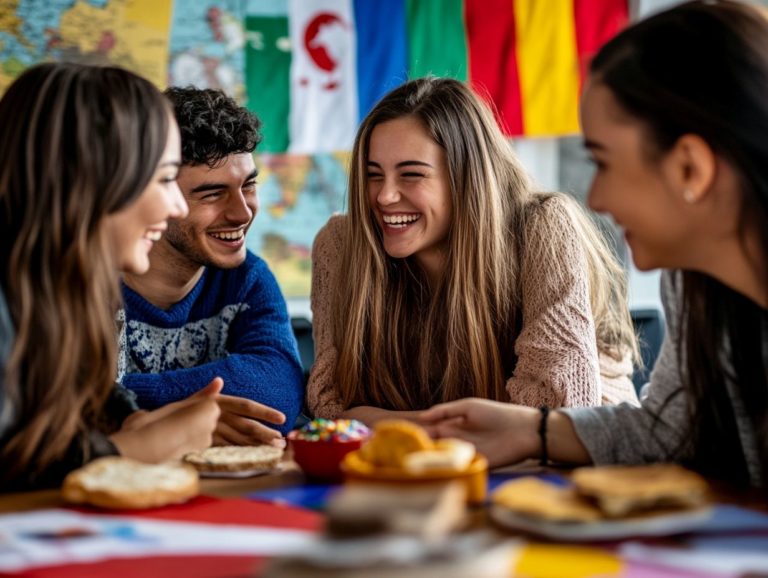how to appreciate local dialects in cultural context
Local dialects are not just variations in speech; they are vibrant expressions of cultural identity and heritage.
Getting to know these unique linguistic forms enhances your appreciation of the communities they represent. This exploration delves into the significance of local dialects and examines their role in cultural identity, as well as the challenges that come with understanding them.
It highlights ways to learn about and celebrate these dialects, focusing on efforts to preserve them in our fast-changing world.
Uncover the rich tapestry of local dialects and discover their importance in your life.
Contents
- Key Takeaways:
- Understanding Local Dialects in Cultural Context
- Appreciating Local Dialects
- Challenges of Understanding Dialects
- Preserving and Promoting Local Dialects
- Frequently Asked Questions
- What is the value of appreciating local dialects?
- How can one show appreciation for local dialects?
- Why is it important to appreciate local dialects?
- How can one become more familiar with local dialects?
- Are there any challenges in appreciating local dialects?
- Can appreciation for local dialects benefit language learners?
Key Takeaways:

- Local dialects are valuable forms of language that deserve appreciation and preservation.
- Understanding dialects fosters cultural awareness and promotes diversity.
- Engage with communities to overcome challenges in understanding dialects.
Understanding Local Dialects in Cultural Context
Understanding local dialects within their cultural context is essential for cultivating deeper appreciation and insight. These dialects are not just tools for communication; they carry cultural details and historical significance.
They embody the complexities of community engagement and weave together diverse cultures, each with its unique traditions and customs.
In our interconnected world, recognizing local dialects enriches cross-cultural interactions and fosters cultural sensitivity, enabling you to navigate the intricate web of human connections with grace.
What are Local Dialects?
Local dialects are fascinating variations of a language that thrive within specific regions or communities, each influenced by its own historical, social, and cultural factors.
These dialects come alive with unique phonetic traits, quirky vocabulary, and grammatical structures that can set them apart from standard forms of the language.
A single word might carry different meanings or usages based on the region, illustrating the rich tapestry of language and cultural understanding.
The variations in intonation and pronunciation resonate with local identity and serve as a vibrant vehicle for cultural expression. By grasping these local nuances, you can enhance your communication skills and build deeper connections with speakers, allowing for a more authentic appreciation of their heritage.
Why are They Important to Cultural Identity?
Local dialects are vital in shaping cultural identity, encapsulating the historical context and social fabric of communities. They foster a sense of belonging and elevate cultural appreciation.
These distinct forms of expression enhance community engagement and serve as conduits for passing down cherished traditions and values. By nurturing an understanding of local dialects, you can cultivate deeper cultural sensitivity, recognizing the richness in every phrase.
When individuals communicate in their native tongues, they forge connections that transcend mere words, creating a shared bond that celebrates diversity. This appreciation allows communities to sustain their heritage while inviting curiosity, ultimately enriching the cultural landscape.
Appreciating Local Dialects
Appreciating local dialects is an essential step toward cultural appreciation, allowing you to connect with the intricate details and rich traditions that define diverse communities worldwide. To deepen this connection, consider how to use local customs to enhance language skills.
Embracing these unique forms of expression enriches your understanding and deepens your engagement with the vibrant tapestry of human experience.
Take the time to explore local dialects in your area and discover the stories and traditions they carry.
Ways to Learn and Understand Dialects

Learning local dialects enhances your cultural understanding. You can achieve this through immersion, community engagement, and educational resources.
Enroll in structured language courses to grasp the nuances defining a dialect. This fosters a deeper connection to the culture.
Participating in community events exposes you to local expressions and idioms. It also helps you build relationships with native speakers.
Engage in experiences where you interact with locals in everyday settings. This approach proves invaluable for practical application.
These methods work together to deepen your appreciation of the language and the rich traditions it embodies. They ultimately bridge gaps and enhance your interpersonal connections.
Benefits of Appreciating Local Dialects
The advantages of appreciating local dialects extend beyond acquiring language skills. They include heightened cultural sensitivity, improved global communication, and deeper community engagement.
Recognizing distinct regional speech patterns cultivates empathy, strengthening relationships in diverse environments.
Understanding local dialects offers profound insights into cultural narratives. This encourages genuine appreciation for traditions and values that might otherwise escape your notice.
Such awareness fosters effective cross-cultural interactions, allowing you to connect meaningfully with individuals from varied backgrounds.
Ultimately, embracing these linguistic variations celebrates diversity and enriches your collective experiences, contributing to stronger, more harmonious communities.
Challenges of Understanding Dialects
Navigating local dialects presents challenges like linguistic barriers and cultural misunderstandings. It s essential to approach these dialects with an open mind and a genuine willingness to learn.
Embracing this journey enriches your understanding and fosters meaningful connections within diverse communities.
Barriers to Appreciating Dialects
Barriers to appreciating local dialects often arise from preconceived notions and societal attitudes that overlook the value of cultural diversity.
Many individuals associate certain dialects with socioeconomic status or educational background, leading to unjust stereotypes.
Media representations often reinforce these biases, portraying diverse speech patterns as comical or inferior. This discourages genuine appreciation.
Lack of personal exposure can lead to ignorance, as there might not be ample opportunity to engage with the communities that cherish these dialects.
Understanding these nuances is essential for fostering cultural sensitivity, encouraging you to recognize and celebrate the richness of linguistic variety rather than dismiss it.
Overcoming Challenges in Understanding Dialects
Overcoming the challenges of understanding local dialects requires targeted solutions like active learning and cultural immersion.
To navigate the complexities of regional variations, consider enrolling in language exchange programs. These programs offer fantastic opportunities to practice your conversational skills with native speakers.
Attending cultural workshops significantly deepens your appreciation and understanding of dialect nuances. These vibrant settings cultivate your linguistic abilities and immerse you in local culture.
Using online resources and apps designed for dialect learning enhances your journey. These accessible tools are invaluable for promoting both your linguistic skills and cultural understanding.
Preserving and Promoting Local Dialects

Preserving and promoting local dialects is vital for safeguarding cultural heritage. These dialects embody the richness of cultural expressions woven into festivals, traditions, and community engagement activities.
They serve as a bridge to the past and a foundation for the future.
Efforts to Preserve Dialects in Modern Society
Preserving local dialects is vital. It reflects our appreciation for cultural diversity and community engagement.
As communities recognize the unique expressions and rich histories woven into these dialects, various initiatives are taking shape to ensure their survival. Linguists are conducting research to document and analyze these languages, providing invaluable insights that reflect the nuances of regional identities.
Local organizations are launching programs. They teach dialects to younger generations and nurture pride in cultural heritage.
Schools now integrate dialect education into their curricula. This allows students to connect with their cultural heritage while sharpening their linguistic skills.
Collectively, these efforts enhance cultural awareness and highlight the significance of the variety of languages in our interconnected world.
Ways to Promote and Celebrate Local Dialects
Celebrate local dialects through thrilling festivals and engaging community events! These are designed to showcase the richness of diverse cultures.
Take, for instance, the annual Dialect Festival in Wales. This event gathers speakers from various regions, creating an atmosphere ripe for learning and appreciation.
Local storytelling nights, where residents share tales in their native dialects, foster a profound sense of community and pride. They inspire younger generations to embrace their linguistic heritage.
Consider initiatives like ‘Dialect Days’ in schools. They promote the teaching and use of local languages through engaging activities, drawing families into the celebration and emphasizing the significance of preserving unique cultural identities.
Through these efforts, communities honor their past. They also engage in meaningful conversations about the future.
Frequently Asked Questions
What is the value of appreciating local dialects?
Appreciating local dialects means understanding and valuing the unique language and speech patterns used by a particular group of people within their cultural background.
How can one show appreciation for local dialects?

Some ways to show appreciation include actively listening and learning about the linguistic and cultural background of the dialect, using it respectfully in conversations, and supporting efforts to preserve and promote its use.
Why is it important to appreciate local dialects?
Appreciating local dialects is important because it helps preserve and promote linguistic diversity, an essential part of cultural heritage and identity. It also fosters understanding and respect for different cultures and ways of communicating.
How can one become more familiar with local dialects?
One can become more familiar by actively engaging with the community that speaks the dialect, attending cultural events and festivals, reading literature and listening to music in the dialect, and seeking out opportunities for language exchange or classes.
Are there any challenges in appreciating local dialects?
Yes, challenges can include a lack of resources or access to learning materials, potential language barriers, and cultural insensitivity or stereotypes. It is important to approach the process with an open mind and a willingness to learn and understand.
Can appreciation for local dialects benefit language learners?
Yes, appreciating local dialects can greatly benefit language learners. It allows for deeper understanding and immersion in the culture and language being studied. It can also help improve language skills and facilitate connections with native speakers.
Join your local dialect festival and experience the richness of your community s language! Act now to preserve these essential parts of our heritage before they fade away!




